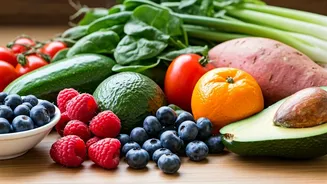Fueling Your Gut
The gut microbiome, an ecosystem of trillions of microorganisms residing in your digestive tract, plays a critical role in overall health. A healthy gut microbiome is linked
to improved digestion, enhanced immunity, and even better mental health. The foods we consume are the primary source of fuel for these microbes, influencing their composition and activity. By consciously choosing what we eat, we can nurture a diverse and thriving gut environment. This means that each food choice can make a real difference to well-being. Focusing on a diet rich in a variety of foods that promote gut health is crucial. The following list showcases the ten best foods to support your gut microbiome, according to a Harvard-trained gastroenterologist. These items are easily accessible, and integrating them into your meals is simpler than you might think.
Fiber-Rich Foods
Fiber is one of the most important elements for a healthy gut. It acts as a prebiotic, which feeds the beneficial bacteria in your gut. Foods high in fiber promote regularity, preventing both constipation and other digestive issues. Several items are excellent sources of fiber and are recommended for enhancing your gut health. Firstly, there are oats. Oats are a great breakfast choice and are packed with soluble fiber, which helps to lower cholesterol and feed beneficial gut bacteria. Secondly, consider barley. Barley is another fiber-rich grain that has been linked to improved digestion and reduced inflammation. Thirdly, include apples in your diet. Apples contain pectin, a type of fiber that acts as a prebiotic, supporting the growth of good bacteria. Consuming these fiber-rich foods regularly can significantly improve your gut microbiome, leading to a healthier digestive system and overall well-being.
Fermented Foods
Fermented foods introduce live bacteria and probiotics directly to the gut. These foods contribute to a diverse and balanced microbiome. Fermentation is a natural process that preserves food while creating beneficial bacteria. The inclusion of fermented foods in your diet can enrich the diversity and function of your gut microbiome. Here are a couple of examples of these foods. Firstly, seaweed. Seaweed is a nutrient-dense food that contains prebiotics, which feed the good bacteria in your gut. Moreover, seaweed contains compounds that have been shown to have anti-inflammatory properties, benefiting gut health. Secondly, consider leeks, which are another excellent source of prebiotics that contribute to a healthy gut microbiome. Incorporating these fermented foods into your diet supports gut health and enhances digestive function.
Healthy Vegetables
Vegetables, particularly those with specific properties, are beneficial for gut health. They contain various vitamins, minerals, and compounds that support a healthy gut microbiome. These vegetables offer multiple benefits to your gut and overall well-being. Firstly, broccoli, a cruciferous vegetable, is rich in fiber and antioxidants. It supports gut health and can help prevent various diseases. Secondly, garlic, which has antimicrobial properties, can help balance the gut flora. Garlic can help inhibit the growth of harmful bacteria and promote a healthier gut environment. Thirdly, onion, which contains prebiotics, which nourish beneficial gut bacteria. Including these vegetables in your diet can promote gut health and overall well-being.
Other Beneficial Foods
Besides fiber-rich, fermented foods, and certain vegetables, other food groups can also support a healthy gut. These food items provide unique benefits to your gut microbiome. Firstly, bananas. Greenish bananas are a source of resistant starch, which behaves like fiber and feeds beneficial bacteria in the gut. Secondly, consider chicory root, another great source of inulin, a type of fiber that functions as a prebiotic, promoting the growth of good bacteria. The inclusion of these foods in your daily meals supports the diverse and balanced gut microbiome, which is essential for improved digestion and overall health. The right food choices can positively impact your gut health, promoting better digestion, enhanced immunity, and overall well-being.















